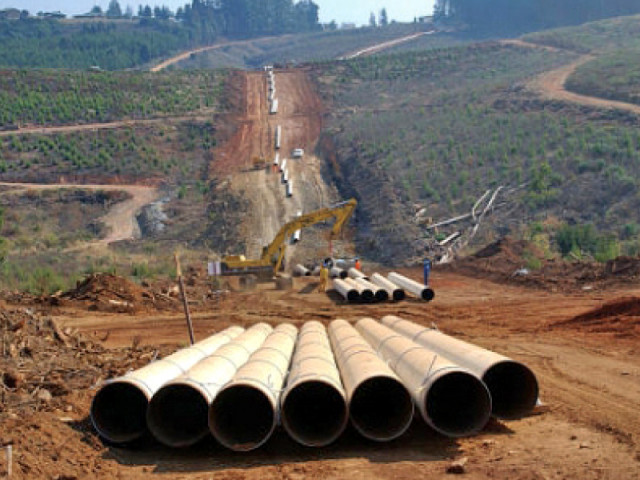Financing plans: Govt to collect $1b in cess for funding gas pipeline
Gives firm commitment to Iran under cooperation agreement.

Around $90 million is required for purchasing pipes, $46 million for setting up a compression station, $56 million for construction work, $35 million for land acquisition and $152 million for paying duties, cost of transport and other procurements. PHOTO: FILE
Pakistan has given firm assurance to Iran under the government-to-government cooperation agreement that it will collect $1 billion through gas infrastructure development cess from consumers to finance the construction of gas pipeline at home, which will lead to a reduction of 20 to 25% in tariff after gas imports start in December 2014.
“Following this guarantee, Iran has committed to providing a loan of $500 million for laying Pakistan’s portion of the Iran-Pakistan (IP) pipeline,” disclosed an official of the Ministry of Finance, who was part of negotiations held this week between Pakistan and Iran in Islamabad.
Total cost of the pipeline, to be constructed by Iranian firm Tadbir Energy, has been projected at $1.5 billion.
According to sources, the government immediately needs $379 million to kick off work on the pipeline from the Iranian border. “Immediate cash flow is of paramount importance as it will provide the basis for initiating work,” the official added.
Around $90 million is required for purchasing pipes, $46 million for setting up a compression station, $56 million for construction work, $35 million for land acquisition and $152 million for paying duties, cost of transport and other procurements.

According to the finance ministry official, the cess will be treated as equity in the project and the government of Pakistan will be the owner of the pipeline. This equity is expected to lead to savings of around $360 million in interest charges and reduction of around 20 to 25% in overall tariff after the start of gas flow. The debt part of the project will comprise 30 to 35% of the pipeline cost.
Financing through cess will slash the dollar component of the cost as a substantial percentage of tax will go to local contractors in Pakistani rupee.
Before the start of construction work, Inter State Gas Systems (ISGS) will enter into an engineering, procurement and construction (EPC) contract with Tadbir Energy. The pipeline will be commissioned before January 1, 2015.
The government of Pakistan will provide sovereign guarantees to Iran against the loan of $500 million, which will form the basis for implementation of EPC contract as per government-to-government agreement.
The cabinet, in its meeting on December 30, 2012, had approved the initial cooperation agreement between the governments of Pakistan and Iran for constructing the pipeline against financing facility of $250 million, with possible increase to $500 million.
It also approved issuance of sovereign guarantees for the financing arrangement. The cabinet gave the green signal to allocating the cess for the project.
Published in The Express Tribune, February 17th, 2013.
Like Business on Facebook to stay informed and join in the conversation.



















COMMENTS
Comments are moderated and generally will be posted if they are on-topic and not abusive.
For more information, please see our Comments FAQ